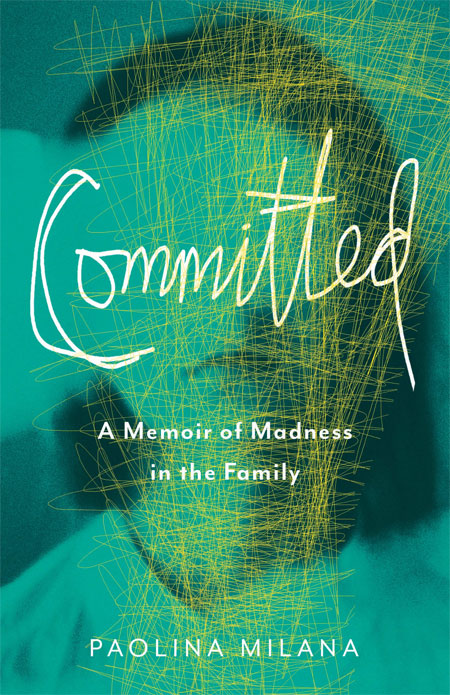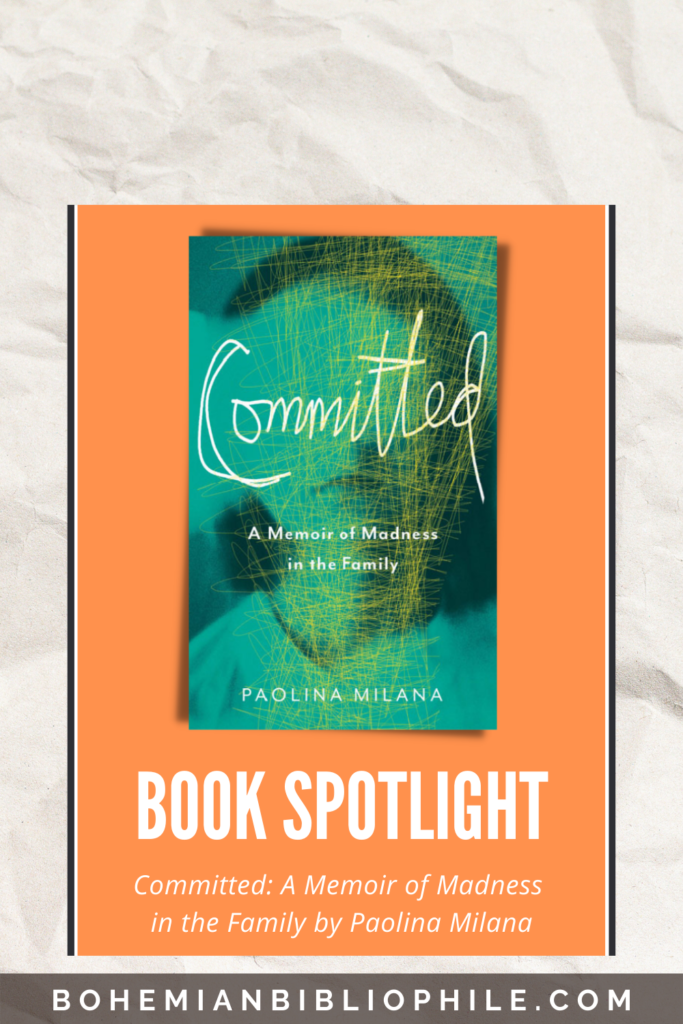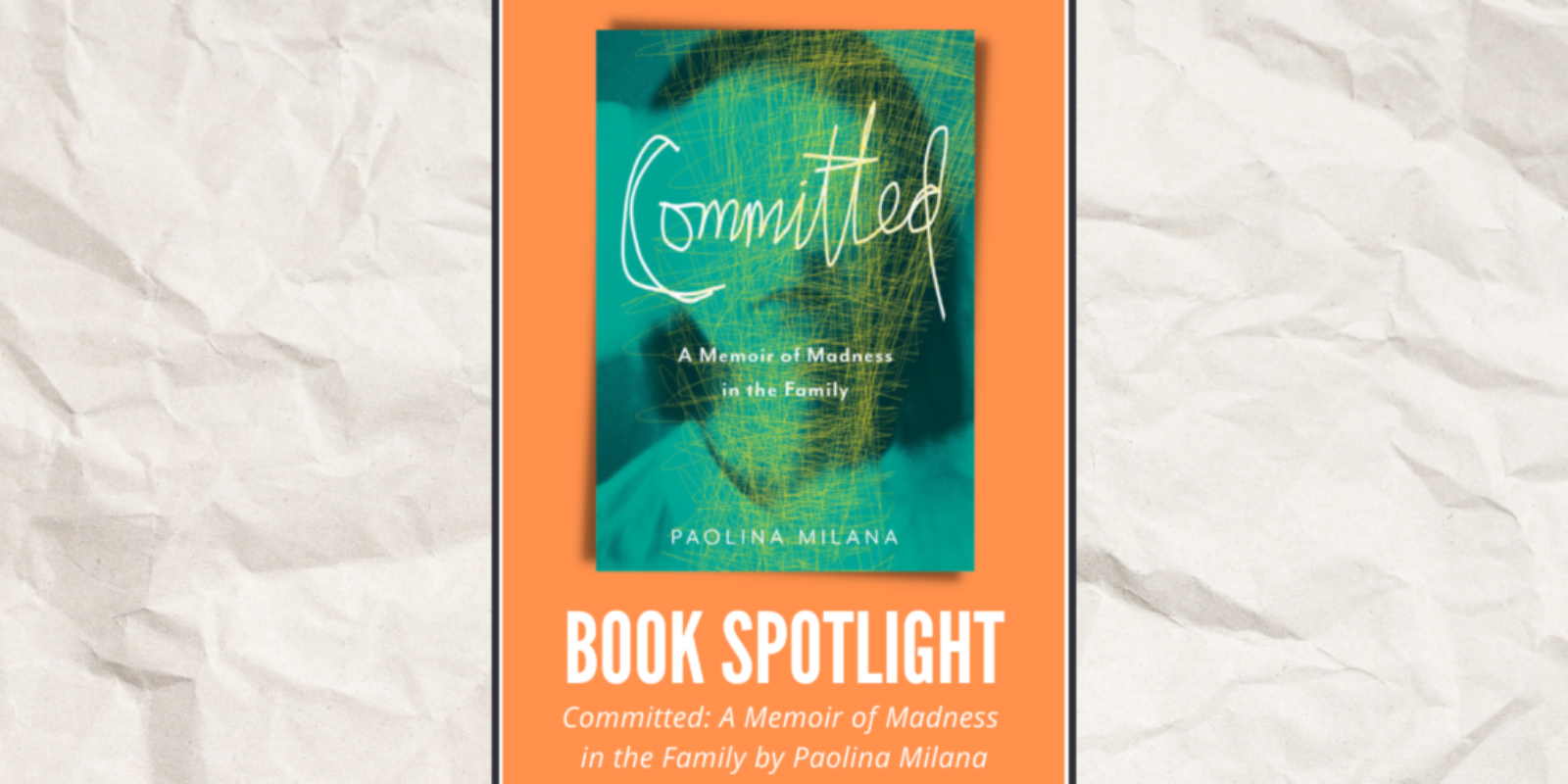
Genre: Non-fiction
Pages: 256
Publisher: She Writes Press
Published: May 2021
Buy on Amazon | Add to Goodreads
Paolina Milana had to play caretaker, secret keeper, and maintain a “normal” life while voices in her head worried her about her own sanity. Committed: A Memoir of Madness in the Family is a memoir detailing what it is like to grow up with a paranoid schizophrenia mother only to discover that the little sister shares a similar diagnosis of mental illness. Milana inspires us with her triumphs and resiliency and offers solace to those burdened with the role of caretaker to a family member with mental health issues.
Beautifully written with flourishes of handwritten letters (in Italian) from her parents, recordings of her own inner voices challenging her every move, and a heartbreaking slew of sticky notes revealing the harrowing thoughts of her sister’s delusional mind, Paolina’s epistolary memoir invites readers into her inner circle of intimate encounters with mental illness. Poignant and impactful, Committed is a story of resilience that educates and inspires, not as a tidy narrative, but as an authentic and rare share that speaks to the struggle of staying sane despite being surrounded by madness.
Committed is the sequel to the author’s 2015 memoir The S Word. Both include harrowing accounts of growing up with and becoming a caregiver to loved ones diagnosed with schizophrenia.
Committed: A Memoir of Madness in the Family is out on May 4th in honor of Mental Health Awareness Month.
Excerpt
We had just committed mamma to a psychiatric ward. I think we ended up putting her in the University of Chicago hospital that time, but I can’t be sure. It was hard to keep track. At the age of fourteen, I had had my fill of hospitals and mental illness and doctors who seemed to know less than I did about the reality of having a mom diagnosed with paranoid schizophrenia. None of the medications seemed to work, although my mamma’s refusal to take them had a lot to do with their effect or lack thereof.
Mamma continued to believe in her conspiracy theories— mostly, that the house was bugged and outfitted with cameras that captured her every move on tape. Usually, she saw herself naked, displayed in lewd photographs in national magazines and on the television news stations. And she was convinced her entire family—Papà, my nineteen-year-old sister, Caterina (Cathy), my seventeen-year-old brother Rosario (Ross), yours truly, and even the baby of our family, my twelve-year-old sister Vincenzina (Viny)—were in cahoots with the authorities, and part of a master plan to do her in.
Why did she believe such things? Your guess is as good as mine. Auditory and visual hallucinations are symptoms of paranoid schizophrenia. And in Mamma’s case, her mental illness had gone untreated for so long, with one misdiagnosis after the next, that she had become rageful and scary and a threat to herself and others. She kept knives and baseball bats under her mattress and often threatened to kill Papa in his sleep or set the house on fire and take us all out in one fiery blast.
Kill or be killed. That was where we were at in 1979. When we admitted her to the psych ward against her will, we were told we were not allowed to visit for a couple of weeks. Hospital rules demanded it. And I could not have been more thankful. With Mamma gone, my entire family, for the first time in I don’t know how long, slept. The house was silent; the tension, fear, and drama disappeared. And even though we all knew it was just for a few weeks, we rejoiced in it, welcomed it, pretended it would go on forever.
Unfortunately, it wouldn’t. On the day we were first allowed to visit Mamma, all five of us robotically shuffled down the hospital’s long halls, illuminated by the flood of light coming from a row of hanging pendant fixtures overhead. I guessed that this was similar to walking down death row in prison. We were just as alone, despite being all together.
Surprisingly, while we were there to see her, Mamma wasn’t there to see us. Somehow, she had disappeared. She was nowhere to be found, either in the hospital or on its grounds. It was as if she had just vanished. Papà was bewildered. We kids were confused. The doctors and nurses on the floor raced around, apologized, and expressed complete disbelief that anybody could slip out of their psych ward, let alone the entire hospital, undetected.
But Mamma wasn’t like anybody else. She was extremely intelligent and artistic, a seamstress so talented that when she emigrated from her hometown of Nicosia, Sicily, to the United States at the age of thirty-one in 1958, the famous designer Emilio Pucci commissioned her to sew for him in Chicago. She was also beautiful. When my papà, Antonino, a self-made barber ten years her senior, was on a ship heading toward his own American dream, he befriended Mamma’s younger brother, Salvatore, who showed Papà a photo of his still-single sister Maria—Mamma in her twenties—dressed as a mandolin player in celebration of Carnivale. My father loved playing il mandolino, and when he saw the young woman in the photo with her hair the color of night, skin as smooth and creamy as a homemade zabaglione, blood-red lipstick—her signature—and curves that filled out that mandolin player’s costume, to hear him tell it, he was hit by “the thunderbolt,” just like The Godfather’s Michael Corleone when he first laid eyes on his Apollonia.
But when he learned of Mamma’s disappearance from the hospital that day, he became struck by something else: confusion. The man I’d grown up with, who had always found his way regardless of the circumstances, at that moment no longer could.
After spending an hour or so searching for Mamma at the hospital, we gave up and left. After we made our way back to our car and all of us took our places inside, Papà started up the engine and pulled out from the parking spot. We silently inched our way through the neighborhoods of Hyde Park (at that time, the late ’70s, not exactly the safest place to be at night). I gazed out the side window, watching the puffs of smoke burp out from the exhaust pipes of other cars on the road. Slowly, I began to realize that we had passed the same houses a couple of times.
I started to pay closer attention. Same street. Same turns. And then Papà stopped the car and pulled over.
Our human GPS had broken down.
“Ma, bambini, dove siamo?” Papà, in a very nervous, frightened voice, was asking us where we were.
That shook me to my core. He never got lost. And here, finally, Mamma’s madness had succeeded in breaking him. He no longer knew the way.
I shook my head clear, expelling the memory, and focused on where I was now, my college campus surroundings. I wasn’t lost. I was exploring. This had nothing to do with any kind of madness. It was completely normal.
Yeah, but where the heck are we?
No clue.
So many towering trees, sunshine peeking through their branches and playing hide-and-seek with the leaves, creating shadowy figures on the ground: this is what surrounded me. I slowly surveyed the crisscrossing walking paths that stretched out before me, beckoning me to follow. I had already followed them for what felt like miles, and despite having a map in hand, I’d managed to get completely turned around.
“A volte devi grattarti la testa,” Papà would say.
At that moment, I, too, found myself doing exactly that— scratching my own head and wondering how to get to my ntended destinations: Curtiss Hall and Memorial Union.
I tried to focus. I had promised myself I wouldn’t do this— wouldn’t think of home or Mamma or my siblings or even Papà while away at school. And here I had been doing just that, which was why, probably, I had gotten distracted and, subsequently, lost. I thought you said you weren’t lost.
I needed to quiet my inner naysayers. How, exactly, I would do that was still an unknown. Keeping that little bit of insanity inside of me at bay was proving more of a challenge than I had anticipated.
Book Spotlight – Committed: A Memoir of Madness in the Family by Paolina Milana #CauseAChatter #MentalHealthTalks #BookChatter @blogchatter #BohoPonderings Share on X
About Paolina Milana:

Author, speaker, podcaster, and founder of Madness To Magic, Paolina Milana’s mission is to share stories that celebrate the triumph of the human spirit: To unleash the power that lies within each of us to bring about change for the better. An award-winning writer, Paolina uses storytelling techniques in her resilience and empowerment coaching to help people become the heroes of their own stories–reimagining their circumstances, rewriting their next chapters, and stepping into their power.
Paolina has won awards for her writing, including her first book, The S Word, which received the National Indie Excellence Award. Her self-help picture book for adults, Seriously! Are We There Yet?!, and her holiday fiction novel, Miracle on Mall Drive, both published in late 2020. Paolina is a first-generation Sicilian American and lives on the edge of the Angeles National Forest in Southern California.
This post is part of Blogchatter’s CauseAChatter

I would like to thank PR by the Book for providing a digital copy of the book for the blog tour. All opinions are my own.
This post may contain affiliate links. If you click on a link and make a purchase, I may receive a very small percentage of the sale at no cost to you.
Image by KatinkavomWolfenmond from Pixabay

